News of the Week 11: 5 – 11 February
City Campus construction starting
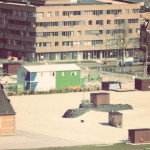 In May, construction on a new campus north of UMCG will begin. Lifelines will move out of the historic building at Bloemsingel 1 to make room for the University College. The Boden terrain, part of the CiBoGa terrain, is currently being prepared for the construction.
In May, construction on a new campus north of UMCG will begin. Lifelines will move out of the historic building at Bloemsingel 1 to make room for the University College. The Boden terrain, part of the CiBoGa terrain, is currently being prepared for the construction.
Usva is also moving to the campus and the Aclo will be adding a branch of the Sportcentrum there as well. What the new campus will be called is not certain, although some documents refer to it as the City Campus. It will become the fourth campus at the RUG.
New particle physics institute
 Last week, the RUG opened the new Van Swinderen Institute to study particle physics. Until 2013, the KVI – Center for Advanced Radiation Technology – was the flagship of the RUG, but too few research projects and an outdated particle accelerator meant it was no longer viable.
Last week, the RUG opened the new Van Swinderen Institute to study particle physics. Until 2013, the KVI – Center for Advanced Radiation Technology – was the flagship of the RUG, but too few research projects and an outdated particle accelerator meant it was no longer viable.
Employees were reassigned to the new KVI-CART and the Faculty of Math and Natural Sciences, of which Van Swinderen Institute is a component. Theoreticians from the former Centre for Theoretical Physics are also on staff. The institute is affiliated with the NIKHEF, a Dutch organization connected to the particle accelerator in Geneva.
Politicians support Zernike housing
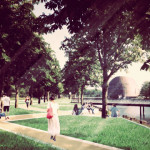 Municipal members of the Stadspartij, PvdA and SP support building student housing at Zernike. ‘International students don’t want to live in Vinkhuizen. For them, Zernike is the place to be’, PvdA council member Maarten van der Laan says. The parties also want to assess how much demand there is for rooms in the northern part of the city.
Municipal members of the Stadspartij, PvdA and SP support building student housing at Zernike. ‘International students don’t want to live in Vinkhuizen. For them, Zernike is the place to be’, PvdA council member Maarten van der Laan says. The parties also want to assess how much demand there is for rooms in the northern part of the city.
The RUG, Hanzehogeschool, municipality and the province of Groningen presented their plans for Zernike’s future in January. The drab industrial area should become more like a park over the next ten years with a mix of businesses, educational and exercise facilities.
Medical students perform unusually well
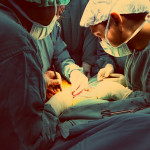 Among freshmen in the medicine bachelor programme, 93 percent passed their first semester classes. The new bachelor programme may be the cause. UMCG education dean Jan Borleffs says, ‘Maybe collective testing leads to students being more familiar with the course material, which leads to higher scores.’
Among freshmen in the medicine bachelor programme, 93 percent passed their first semester classes. The new bachelor programme may be the cause. UMCG education dean Jan Borleffs says, ‘Maybe collective testing leads to students being more familiar with the course material, which leads to higher scores.’
Even though more students passed than usual, there are also far fewer students who got an 8 or a 9. ‘There are very few outliers. That probably means that the exams were quite difficult’, Borleffs says. The faculty council is calling for the quality of exams to be more closely monitored.
Medical school starting voucher system
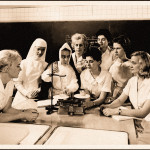 Next year, the medical school will launch a voucher system for students to ‘buy’ time in classes outside their normal curriculum. Faculty criticism of the system seems to have been dismissed.
Next year, the medical school will launch a voucher system for students to ‘buy’ time in classes outside their normal curriculum. Faculty criticism of the system seems to have been dismissed.
Every freshman will receive one voucher that entitles them to one hour of class. But potential issues remain; for example, if all students use their vouchers to follow surgery lectures, the department may be unprepared for the influx. The budget is set at 420 lecturer working hours.
Too busy for University Council
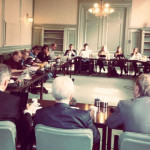 The University Council personnel faction is struggling to find new candidates: many employees hesitate due to how busy they already are, even though there is financial compensation for the council work. That sentiment was expressed by the faction in an open letter to the rector, faculty deans and directors at the RUG.
The University Council personnel faction is struggling to find new candidates: many employees hesitate due to how busy they already are, even though there is financial compensation for the council work. That sentiment was expressed by the faction in an open letter to the rector, faculty deans and directors at the RUG.
The faction tweeted last week that, like in Amsterdam, there is a dissatisfaction with the state of affairs at the University. But due to their challenging workload and temporary contracts, most choose to keep their mouth shut.
Lecturers join Amsterdam protests
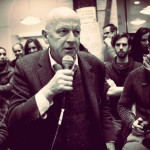 Last week, lecturers in Amsterdam joined protesting students in their call for more democracy, a temporary stop to the sale of UvA buildings and conducting independent research into university financing. In an open letter, they said they would go on strike, begin petitions and occupy buildings if the university board did not respond. Around 300 humanities lecturers and 90 from other faculties co-signed the letter.
Last week, lecturers in Amsterdam joined protesting students in their call for more democracy, a temporary stop to the sale of UvA buildings and conducting independent research into university financing. In an open letter, they said they would go on strike, begin petitions and occupy buildings if the university board did not respond. Around 300 humanities lecturers and 90 from other faculties co-signed the letter.
They are also calling for a ‘genuine academic environment where research and education can be combined’, a proportional workload and financing that is not based strictly on enrollment numbers.
[adrotate banner=”33″]





